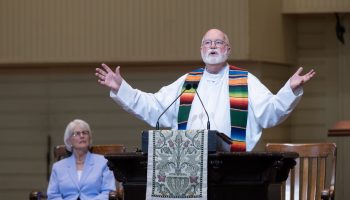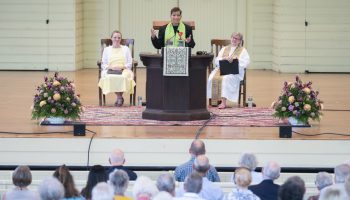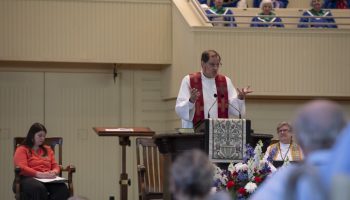By its very definition, the term “denomination” has bounds. However, it has always been inclusive on the grounds of the Institution. With the Chautauqua Dialogues program being run by the denominational houses for the first time in six seasons this summer, inclusive takes on an new meaning.
The structure of the program has undergone a few changes in preparation for this season. Before this year, visitors could sign up for the following week’s dialogues at the Interfaith Lecture Series in the Hall of Philosophy.
From there, the program was held from 3:30 to 5 p.m. every Friday in various locations on the grounds. The idea was create spaces for small-group dialogues based on those 2 p.m. lectures.
The idea is the same, but now, signing up beforehand is no longer required, and each denominational house will set aside its own time for Chautauquans to engage in structured, meaningful dialogue with a trained facilitator in-house. The times and locations are forthcoming and to be published in the Daily.
Roger Doebke, co-coordinator of Chautauqua Dialogues, spent a great deal of time assessing the strengths and weaknesses of the program throughout the years and believes these changes are crucial to the evolution of the dialogues.
“We learned by experience that a lot of people would come with their mind made up about an issue,” he said. “That doesn’t set the tone that we want to start with. The vision of the dialogues is to bring people together and not only have them talk about the issues they’re hearing about, but also to help them learn how to talk to each other when people have very divergent opinions.”
The concept of bringing people together became an easier task for Doebke when members of the Chautauqua denominational community agreed to include the Chautauqua Dialogues as part of their normal weekly programming, with the freedom to incorporate it at their own convenience.
“The objective with this in particular, is to make meaningful conversation and engagement a part of the Chautauqua experience in every denominational house — with each house choosing how and when that will happen,” he said. “We want this to empower them. Based on our response so far, we feel that’s happening — that they’re really taking ownership of the opening of the houses to the whole community.”
Once the talks begin, speakers are asked to follow a set of guidelines in order to maximize the quality of conversation. Doebke calls this the “level playing field” approach.
“We don’t want them to establish or say anything that would infer that they have some expertise more than the rest of the people in the group might have about the subject matter, just that you tell us in one or two sentences what has resonated most with you about what you’ve heard in the lectures here,” he said. “The facilitators take notes, and by the end, we can all see a common thread.”
Although much of the program has been revised, the transformation Doebke hopes participants experience is still the same.
“So, what we’re seeking really is how in a conversation do we get people to be open enough to change their mind?” he said. “And that change in mind might just be as simple as, you know, ‘I came in thinking that this was the most important thing, and I am leaving, realizing that wasn’t very important at all. What I’ve heard here, that is what really matters.’ ”





